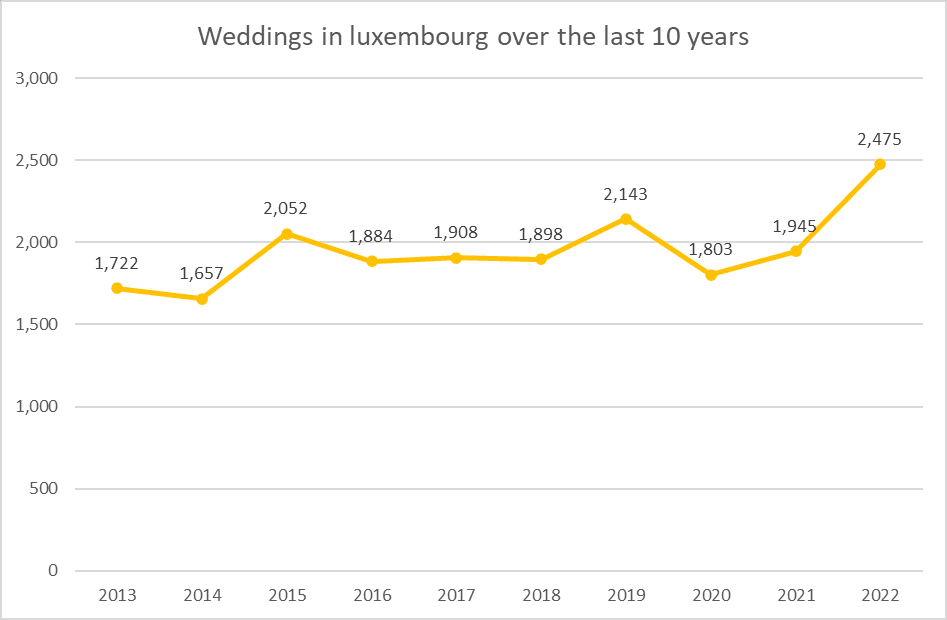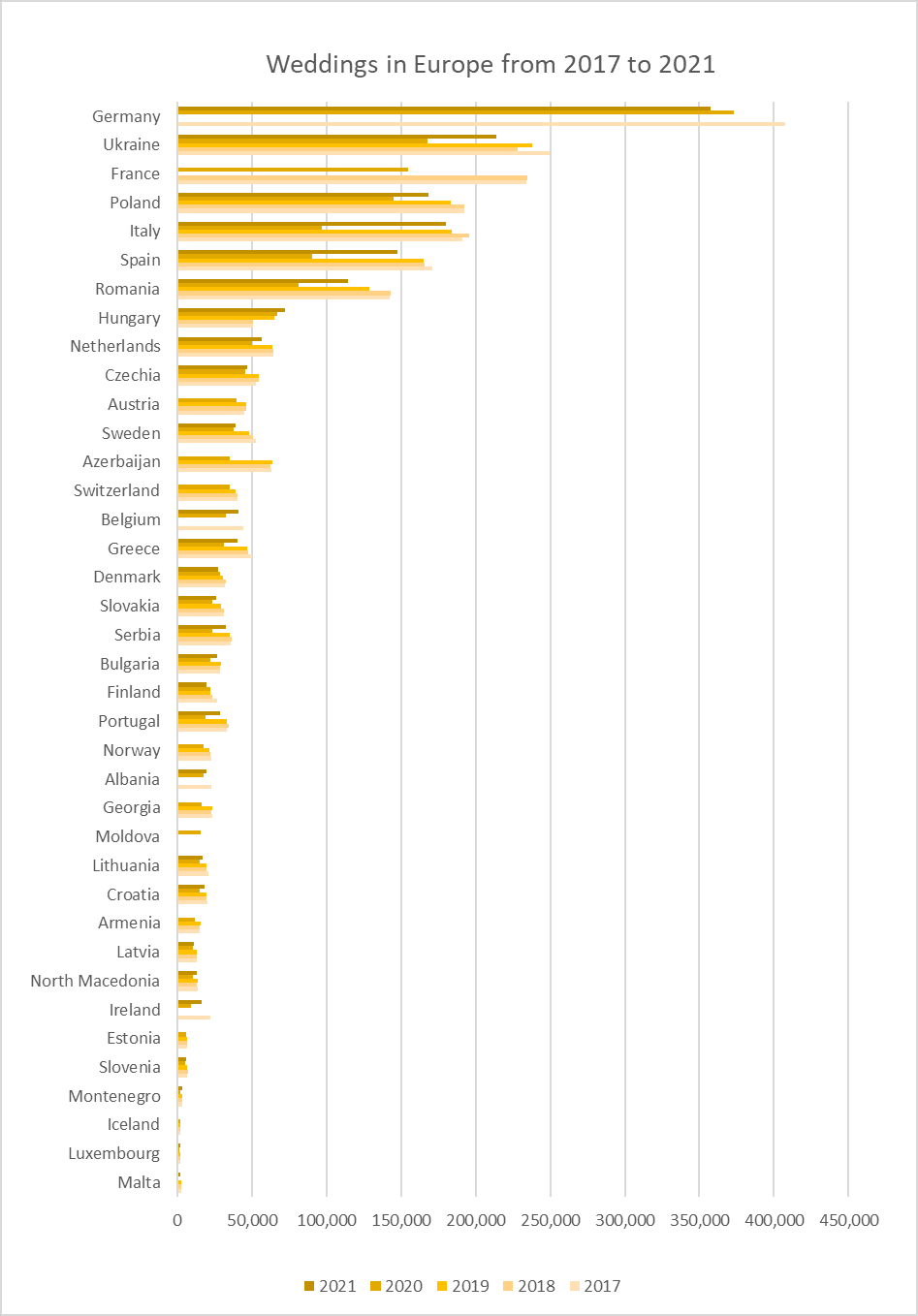
Wedding in Luxembourg
This article ensures your seamless union by navigating through the necessary regulations and paperwork, reminding us that crafting a lifelong commitment requires a thoughtful approach.
Planning a wedding in Luxembourg is a meticulously crafted process, where love meets bureaucracy. We’ll take a closer look at the essentials of a Luxembourgian wedding, from the statistical embrace of matrimony, exploring who is eligible to tie the knot in this picturesque destination, to the step-by-step guide on how to say 'I do' in Luxembourg.
How many people get married in Luxembourg?
Before getting into the bureaucratic intricacies, let's explore the matrimonial landscape in the Grand Duchy. Over the past decade, marriage in Luxembourg has maintained a relatively stable frequency, hovering around 1,900 ceremonies annually. However, the substantial spike in 2022 is noteworthy, witnessing a remarkable increase to 2,475 unions.

When viewed in the broader context of the European Union, this figure may seem significant, yet Luxembourg finds itself towards the lower end of the spectrum. Ranking among the smallest European countries, the subdued wedding count is unsurprising. The list is headed by Turkey, Germany, Ukraine, France and Poland.

Read article
Who can marry in Luxembourg?
Now, transitioning from our insights into Luxembourg's matrimonial landscape, let's explore the specific requirements for a wedding in Luxembourg. To exchange vows in the Grand Duchy, both you and your partner must be at least 18 years old, and one of you must have an official residence in Luxembourg. Interestingly, nationality is not a hindrance, as long as either of you is a Luxembourg resident, you're good to go.
It's crucial to note that, since the implementation of the law on July 4, 2014, and its enactment in January 2015, Luxembourg celebrates marriage equality, allowing unions between couples of the same or different genders. Furthermore, minors can enter matrimony with the authorization of the guardianship judge.
How to get married in Luxembourg?
Now, let's explore the step-by-step process, required documents, and procedures to tie the knot in Luxembourg.
The preliminary steps
Crucial in the journey toward matrimony in Luxembourg is meticulous preparation. The initial step involves a visit to the Civil Registry at least 2 to 3 months before the wedding date.
If both partners are Luxembourg nationals and residents, one of them should attend this office 2 months before the ceremony. In cases where either party is a non-Luxembourg resident, one of the future spouses must visit 3 months in advance.If both partners are Luxembourg nationals and residents, one of them should attend this office 2 months before the ceremony. In cases where either party is a non-Luxembourg resident, one of the future spouses must visit 3 months in advance.
During this visit, both individuals must present their identification documents or passports. The registrar will provide a list of forms to complete and documents to submit. All required documents must be submitted to the Civil Registry no later than 1 month before the wedding date.
It's noteworthy that for the City of Luxembourg, the first physical visit is not mandatory. The document checklist is available online on the city's website. The application needs to be submitted in the presence of both future spouses no later than one month before the wedding date.
The required documents
To ensure a seamless matrimonial journey in Luxembourg, meticulous preparation of the required documents is paramount. It's crucial to note that all documents must be in French, German, or English or accompanied by a certified translation, especially if originating from non-EU countries, where additional authentication through apostille is necessary.


Additional documents may be required based on individual cases:
- Death certificate of the previous spouse.
- Death certificates of parents for minors.
- Marriage certificate with divorce mention or divorce judgment transcription.
- Birth certificates of children to legitimize.
- Previous marriage certificates with divorce mention or divorce judgments.
Special considerations for German and Portuguese nationals
Luxembourg's civil registrar requests a marriage eligibility certificate called "Ehefähigkeitszeugnis," obtainable from the birthplace commune, the last residence commune in Germany, or Standesamt I Berlin if the groom has never lived in Germany.
They must visit the Consulate General of Portugal in Luxembourg together and present the following documents:
- Birth certificate dated within 6 months.
- National identity card or passport.
- Foreign identity card or residence certificate.
- Parental authorization for minors.
- Portuguese birth certificates indicating current civil status.
Upon processing the dossier, the Consulate's services issue the marriage eligibility certificate, along with the attached documents, directly to the municipal administration where the marriage will take place.
The marriage file
Once all the required documents are in hand, the prospective spouses must visit the Civil Registry no later than 1 month before the wedding date. They need to submit all mentioned documents for the constitution of the marriage file, providing details such as:
- Place and date of birth of their parents, their respective addresses, and professions. If a parent is deceased, the place and date of death should be indicated.
- National identification number.
- Number of individuals attending the civil marriage ceremony.
- Their address after the marriage.
This final step ensures the completeness of the marriage file, paving the way for a legally sound and joyous celebration in Luxembourg.
The prior publication
In Luxembourg, every marriage is preceded by a 10-day publication period following the receipt of required documents. This announcement occurs in the commune of the future spouses' residence or the Civil Registry of the municipality where the marriage will take place.
There's a notable exception for Italian nationals. If either spouse was born and has been domiciled in Luxembourg since birth, marriage records are published at the Italian Consulate. If born in Italy, the marriage documentation is published in Italy. In both cases, the civil registry official informs the Italian Consulate for necessary procedures. Additionally, a municipality fee in Italy is applicable.
The marriage ceremony
Once all necessary procedures are complete, it's time to embark on the wedding ceremony in Luxembourg. The date and time of the marriage are determined upon the submission of the complete dossier. Luxembourg allows weddings on any working day of the week, officiated by the mayor, acting as the civil registrar, or a delegate such as an alderman or municipal councilor.
Crucially, the marriage must take place within 12 months of the publication deadline's expiration, or a new publication becomes necessary.
The ceremony occurs in the municipality where one of the future spouses legally resides, typically within the town hall or another designated location approved by the municipal council. Given Luxembourg's status as a secular state, the civil marriage ceremony is separate from any religious rites. Those desiring a religious ceremony can arrange it, but it can only follow the civil marriage, highlighting Luxembourg's dedication to both legal formalities and the secular nature of weddings in Luxembourg.
Which matrimonial regimes are popular in Luxembourg?
In addition to the formalities of arranging and conducting the wedding in Luxembourg, there's a crucial aspect we haven't touched upon: matrimonial regimes.
When entering into marriage, one necessarily adheres to one of these three regimes. If no marital contract is signed, the legal matrimonial regime is automatically applied. However, individuals are free to adopt any other form of marital contract or make changes to the existing regime.
Let's take a brief look into each of these regimes, though it's important to note that we're entering a legal realm with multifaceted implications and details. For a comprehensive understanding of each contract's characteristics and suitability for specific cases, consulting with a legal professional is advisable.
Founded on the principle of a community limited to acquired assets, this regime implies that assets obtained after marriage are communal. However, some assets remain the exclusive property of one spouse if their ownership can be proven, such as those acquired before marriage or through donation or inheritance.
In this regime, spouses retain administration, enjoyment, and free disposition of their personal assets. No common property exists between the married couple. Each spouse is responsible for their debts, whether incurred before or during the marriage. An exception exists for debts related to child education or household maintenance, for which both spouses are jointly responsible.
In this regime, all assets, acquired before and after marriage, belong to both people. There are no separate personal assets, except for personal clothing and family heirlooms. All debts are also communal, making spouses jointly responsible, even for debts incurred by one before marriage.
After at least two years of marriage, spouses are free to make changes to their existing matrimonial regime through a notarized agreement. Understanding these matrimonial regimes is crucial, as they shape the financial landscape of a marriage. Couples should carefully consider their options and, if necessary, seek legal advice to ensure the chosen regime aligns with their circumstances and preferences when planning a wedding in Luxembourg.
What you need to know about paid leave, tax changes and the name of your family
To conclude, let's explore some immediate consequences of marriage in Luxembourg, as it brings various benefits, both to have time to celebrate and to change the status in the society.To conclude, let's explore some immediate consequences of marriage in Luxembourg, as it brings various benefits, both to have time to celebrate and to change the status in the society.
Days off
Taxes
Family name
Frequently Asked Questions (FAQ)
What are the legal requirements for getting married in Luxembourg
To marry in Luxembourg, both partners must be at least 18 years old, and one must have an official residence in the country. Regardless of nationality, one Luxembourg resident is sufficient. The process involves submitting necessary documents to the Civil Registry, typically starting 2-3 months before the wedding.
Does Luxembourg allow gay marriages
Since the implementation of the law on July 4, 2014, and its enactment in January 2015, Luxembourg celebrates marriage equality, allowing unions between couples of the same or different genders.
How many people get married in Luxembourg annually
Luxembourg sees an average of around 1,900 marriages per year. Notably, in 2022, there was a significant increase to 2,475 weddings, showcasing some yearly variation.
Can non-residents marry in Luxembourg
Yes, non-residents can marry in Luxembourg as long as one of the partners has Luxembourg residency. This inclusivity allows couples from diverse backgrounds to celebrate their union in this charming European destination.
What are the available matrimonial regimes in Luxembourg
Source: guichet.public.lu, www.ing.lu, www.justarrived.lu
We took photos from these sources: Damir Babacic for Unsplash